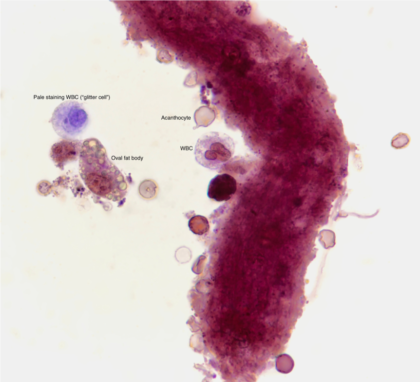As an avid spicy-food eater, I quickly learned the many home-remedies to help with the dreaded heartburn that often accompanies my jalapenos and hot wings. My secret? Well, without fail, a spoonful of Arm & Hammer baking soda into some water does the trick. While it may not be the tastiest of drinks, it is very effective! I am also a huge fan of anything that can save me a few dollars, especially as a student, and I love the idea of something as simple as baking soda being so extremely useful in ways it wasn’t intended. So of course I loved when I learned of a study that used sodium bicarbonate (NaHCO3), aka baking soda, to help reduce inflammation in chronic kidney disease (CKD).
Inflammation is a natural reaction in the body to protect itself from infection, illness, or injury. The hallmark characteristic of inflammation is the increase in white blood cells, immune cells, and cytokines to help fight infection or repair injuries. While some inflammation is good and beneficial, there is a fine balance of pro-inflammatory and anti-inflammatory pathway activation to maintain our bodies in working order (Figure 1). However, when pathological conditions are present, the pro-inflammatory pathway can become overactive and result in chronic inflammation, causing further damage to organs. In fact, this is the case in both chronic and acute kidney injury. Studies have shown a rapid loss of kidney function is directly associated with elevated inflammatory markers.
Figure 1. Inflammatory balance.
CKD is also associated with reduced acid-base balancing, often resulting in metabolic acidosis, potentially contributing to kidney damage. In this line, counteracting the increased acidity with systemic alkalization, using NaHCO3 for example, may attenuate the acid-induced component of kidney disease. This has been demonstrated in both clinical trials and experimental models – specifically, it was suggested that oral supplementation of NaHCO3 may slow the decline of kidney function in patients with CKD. In a 2-year study with oral sodium bicarbonate supplementation vs standard care, patients receiving sodium bicarbonate supplementation were significantly less likely to exhibit rapid kidney deterioration (9 vs 45%) and fewer developed end stage kidney disease (ESKD) (6.5 in bicarb vs 33% in control group). Use of oral NaHCO3 in patients with CKD appears to help reduce the deleterious effects of metabolic acidosis. Specially, alkalization that counteracts to acid challenge might slow kidney progression by attenuating the contribution of inflammatory contributing factors (Ang II, endothelin, aldosterone, etc.). This led to Ray and colleagues at Augusta University to investigate the influence of oral NaHCO3 supplementation on the anti-inflammatory response in both animal models and humans.
This study investigated the inflammatory response in rats following an oral supplementation of NaHCO3. The authors observed a shift in macrophage polarization from the pro-inflammatory M1 to anti-inflammatory M2 phenotype, contributing to their hypothesis that NaHCO3 is acting to protect kidney function by reducing inflammation. These effects were consistent in hypertensive Dahl salt-sensitive rats, as well as in normotensive Sprague Dawley rats. Perhaps even more importantly, this study translated their findings to humans. Using flow cytometry to measure TNFa and M1 macrophages of human whole-blood samples, oral supplementation of baking soda resulted in a powerful anti-inflammatory response in human subjects.
After confirming their findings in several models, they investigated the mechanism behind the increased anti-inflammatory activity with oral NaHCO3 supplementation. Ray et al hypothesized the effects were mediated through activation of the cholinergic anti-inflammatory pathway. This pathway is consisting of the vagus nerve and contributes to attenuating inflammation and modulating the immune response. To do so, vagal nerve stimulation releases its neurotransmitter acetylcholine to act upon macrophages in the spleen and other cytokines to compensate and bring inflammation into homeostasis (Figure 2). Interestingly, when Ray et al blocked acetylcholine from acting on its receptors with an antagonist or removed the spleen, the beneficial anti-inflammatory actions of NaCHO3 were abolished. These findings support their hypothesis that oral supplementation with baking soda is contributing to a decreased inflammatory status via the cholinergic anti-inflammatory pathway.
Figure 2. Inflammatory reflex by the central nervous system.
Overall, the findings of this study highlight oral NaHCO3 as a cheap, effective and easily accessible method to activate the cholinergic anti-inflammatory pathway in humans. There is more work to be done to further determine the full therapeutic potential of this stimuli, especially when considering the efficacy and side effects. Even though baking soda can be purchased by anyone and just about anywhere, there are some side-effects that patients must be cautious about, especially those prescribed sodium bicarbonate for acidosis treatment. These can include, increased thirst, stomach cramps, bloating, flatulence, nausea, and edema (although the latter is less common). There are also many negative-effects that can occur if too much sodium bicarbonate is ingested, many dealing with gastrointestinal concerns. I also would like to emphasize that treatment with sodium bicarbonate should only be used if prescribed by your physician, for many of the concerns listed above. Despite the great heart-burn relief it provides for me, I only use a small amount and patients should be wary about over consuming. In fact, there is a large quantity of bicarbonate in baking soda: ¼ teaspoon (THAT SAYS TEASPOON) = 1g of sodium bicarbonate.
The clinical significance from this translational study is a step in the right direction and is another use for baking soda. Interestingly, Goraya and colleagues recently investigated the impact of a dietary intervention compared with sodium bicarbonate treatment on metabolic acidosis in CKD. They utilized a diet of base-producing fruits and vegetables to reduce dietary acid by half. The 5-year follow-up showed no difference between sodium bicarbonate and dietary intervention and were comparable in potentially treating to reduce CKD risk. Both of these translational studies have provided great insight on reducing metabolic acidosis and inflammation with easily attainable treatment options.
Casey Derella @derella_casey
PhD Student at Augusta University


